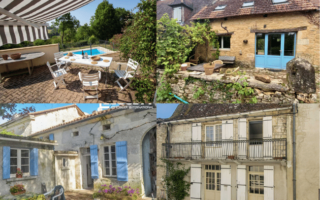The different tax regimes available to businesses in France

If you’re planning to run a business in France then you’ll need to make sure you choose the correct tax regime when setting it up – here is a guide to the different regimes
Debbie Bradbury is co-ordinator of English-speaking clients at accountancy firm SAREG
Once you know what you’d like to do and where it can be achieved, what are the next steps for getting set up in business? Well, this will all depend on the type of business you wish to run as France categorises its professional activities, as well as having different business structures and tax regimes according to various criteria. Here is a very brief summary of the categories, principal business structures and tax regimes, with some examples in each of the different categories.
Categories of professional activities in France
Commercial activities
• Purchase and sale (shop or online)
• Hotel-restaurant
• Catered furnished rental/B&B (sale of furniture, clothing, equipment)
Artisanal activities
• Manufacture/transformation and sale or installation
• Skilled trades (food production, crafts, construction)
Pure service activities
• Intellectual services
• No sales or manufacture (consultants, teachers, architects, translators)
For each category of activity, there is a relevant registration authority and a particular tax regime. For the artisanal activities, which include all the skilled trades, there is also an obligation to follow a course related to running a business in France prior to registration of the business. In any type of professional activity, a professional bank account is required.
_____________________________________________________________________
Don’t miss
Guide to setting up a business in France
5 intriguing businesses set up by expats in France
_____________________________________________________________________
Business structures
In France you can choose to run your business independently, as a sole trader, or set up a partnership or a limited company, according to the needs of the individual.
Sole trader
If you want to work independently and be in full control of your business, the individual enterprise allows you the flexibility of making all your own decisions, taking money from the business when you want and paying income tax on your earnings. If you want to include your spouse in this individual enterprise, you can either employ them or register them as a collaborating spouse; they cannot work without being registered.
Partnership
If you are not married but wish to run a business with a partner, or if you are married but wish to share a business with your spouse rather than having one spouse running the business and the other classed as collaborating spouse, you can run two individual enterprises as a ‘partnership’, only having to provide one set of annual accounts.
Limited company
The other main business structure is the limited company – this can either be as a sole shareholder or with a number of shareholders. Here the company profits are subject to corporation tax, and any remuneration you take individually is then taxed under the income tax regime. You can be remunerated and/or take dividends; dividends can only be distributed at the end of the company’s financial year.
_____________________________________________________________________
Don’t miss
All you need to know about the PAYE tax system in France
Buying an existing business in France
_____________________________________________________________________
Professional tax regimes
In France we distinguish two main professional tax regimes – the reel (profit and loss) and the micro (simplified regime). The simplified regime exists for people who do not have a high level of expenditure and who are perhaps not the best at keeping paperwork in order! There are no profit and loss accounts to prepare and you simply declare your turnover, on which the French tax authorities apply a fixed allowance for expenditure before calculating your income tax liability and social charges.
Micro régime
The maximum turnover thresholds were doubled for 2018 to €70,000 for services/labour
Threshold is €170,000 for sales and catered furnished rental (or combined turnover of both)
Tax-free allowances:
34% for pure service providers
50% for commercial or artisanal services
71% for sales and catered furnished rental
Although the maximum thresholds were increased in 2018 the VAT thresholds remained the same (€33,200 for services/labour and €82,800 for sales and catered furnished rentals). If you exceed these VAT thresholds you will need to register for VAT and charge VAT to your customers.
Social charges are applied to the ‘fixed’ profit after the above allowances, at a rate in the region of 45%
There is an option on the micro regime to register on a ‘pay as you go’ system. All the micro criteria above are valid apart from the calculation of social charges, which is made by applying a fixed rate to the gross turnover according to business activities and whether you are providing sales or services. The rates of social charges take into account a percentage for costs and range from around 13% to 25% of turnover.
Reel régime (profit and loss)
This regime has no turnover thresholds and no fixed allowances for expenditure. It takes into account your gross turnover, deducting true costs and leaving a true profit. Social charges are calculated on the true profit and a proportion of these are then deducted to find the definitive net profit (or deficit).
For partnerships and limited companies the reel regime and annual accounts are obligatory. In the limited company option, social charges are payable on the remuneration taken by the director(s) and the majority of these are deductible from the company profit before corporation tax is calculated. There is always a minimum contribution to healthcare, even if the business is running at a loss, which is in the region of €1,500 per annum.
VAT
You can either choose to be VAT-registered (whatever your level of turnover – particularly if you pay VAT on your purchases) or, if you exceed the above thresholds, you are obliged to register for VAT.
_____________________________________________________________________
Don’t miss
Completing your French income tax return
Understand the French micro-entrepreneur scheme
_____________________________________________________________________
How do these different regimes apply to my business?
1. Running a catered rental business – catered chalet, tables d’hôtes, hotel-type services – commercial activity, registered with the Chamber of Commerce.
On the micro tax regime, you can earn up to €170,000 in gross turnover and a fixed allowance of 71% is applied before the calculation of income tax and social charges. You can opt for the micro-entrepreneur status and pay social charges as you earn, at a fixed rate of 13.1% of turnover; plus a small percentage of consulate taxes and contribution to professional training.
If you exceed the above turnover threshold, or if you purchase property off-plan and wish to recover the VAT, you will be obliged to register on the reel tax regime and the VAT regime. There is a reduced rate of VAT on hotel-type services and passenger transport of 10% but the full rate of 20% is applicable on alcohol sales.
There is no obligation of qualifications or experience, no need to attend the training course related to running a business but if alcohol is to be served to guests, an alcohol licence must be obtained
2. Running a building business, offering services for carpentry, stonemasonry and plastering – artisanal activity, registering with the Chamber of Trade
On the micro tax regime, you can earn up to a total of €170,000 in gross turnover including €70,000 of labour. A fixed allowance of 71% is applied to the sale of materials and 50% to labour before the calculation of income tax and social charges. You can opt for the micro-entrepreneur status and pay social charges as you earn, at a fixed rate of 13.1% of turnover on materials and 23.1% of turnover on labour; plus a small percentage of consulate taxes and contribution to professional training.
If you exceed the above turnover threshold, or if you wish to recover the VAT you spend on materials, equipment and services, you will be obliged to register on the reel tax regime and the VAT regime. There is a reduced rate of VAT on certain renovations of properties used for residential purposes that are more than two years old.
With these skilled trades, you are obliged to prove qualifications or experience in each of the trades you wish to offer, and you will be obliged to attend the training course related to running a business, prior to registration.
3. Providing language lessons to individuals – either in your own home or in the student’s home – pure service provider, registering with URSSAF
On the micro tax regime, you can earn up to €70,000 in gross turnover and a fixed allowance of 34% is applied before the calculation of income tax and social charges. You can opt for the micro-entrepreneur status and pay social charges as you earn, at a fixed rate of 22.9% of turnover; plus a small contribution to professional training.
If you exceed the above turnover threshold, you will be obliged to register on the reel tax regime. VAT is not applicable for language lessons given by individuals to private clients.
There is no obligation of qualifications or experience, no need to attend the training course. Please note that different rules apply to professional training.
Like this? You might enjoy:
Share to: Facebook Twitter LinkedIn Email


